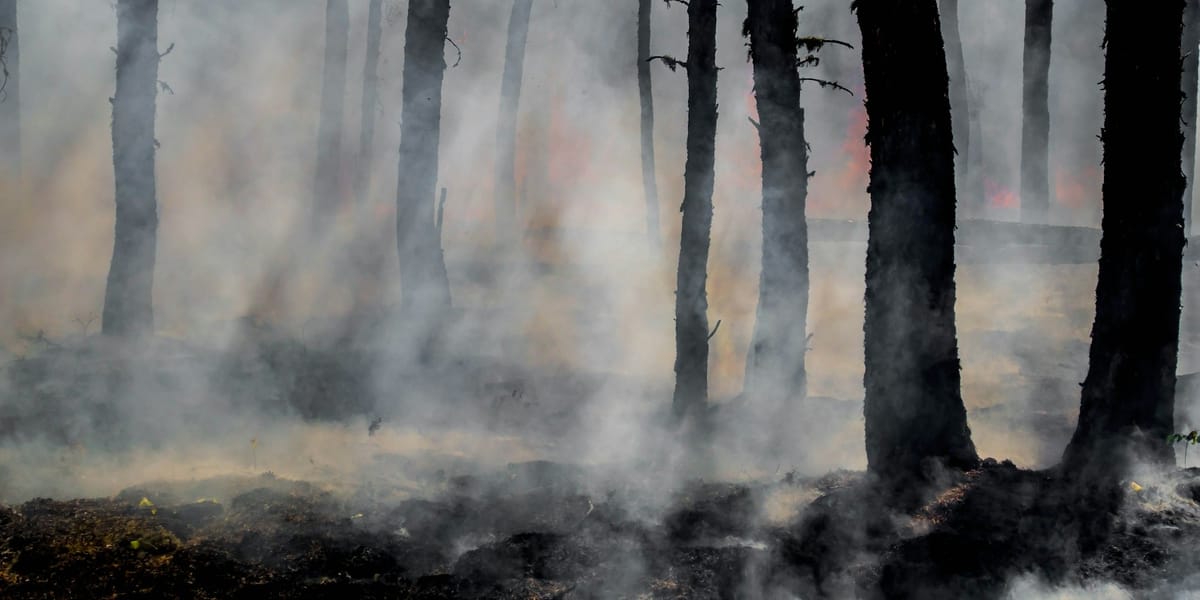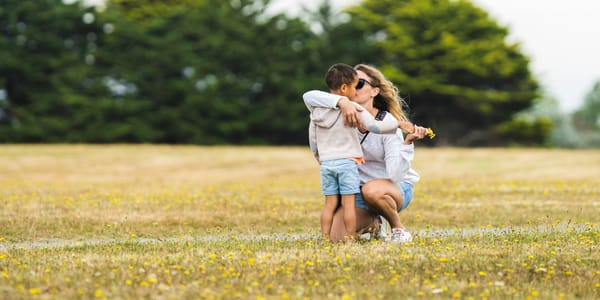When the World Feels Heavy: Understanding Eco-Grief and Climate Anxiety in Canada
Learn about eco-grief and climate anxiety affecting Canadians. Discover coping strategies, signs to watch for, and how to find support for environmental distress and climate-related mental health challenges.

The morning news brings another story about record-breaking wildfires in British Columbia, unprecedented flooding in Atlantic Canada, or rapidly melting Arctic ice. You feel that familiar knot forming in your stomach, a weight settling on your chest as you consider what this means for your children's future, for the wildlife you love, for the very landscape that defines your Canadian identity. If this sounds familiar, you're not alone in experiencing what mental health professionals increasingly recognize as eco-grief and climate anxiety.
These aren't just fleeting worries about environmental changes. They represent profound psychological responses to witnessing and anticipating the loss of natural environments, species, and the stable climate patterns that have shaped Canadian life for generations. From the prairies of Saskatchewan to the coastlines of Nova Scotia, Canadians are grappling with emotions tied directly to environmental change, and it's time we acknowledge these feelings as valid, understandable responses to very real circumstances.
Understanding Eco-Grief: When Environmental Loss Becomes Personal
Eco-grief, sometimes called ecological grief, describes the emotional response to environmental loss and change. This concept, first extensively studied by researchers in Australia, has found particular relevance in Canada, where our national identity is deeply intertwined with our natural landscapes. When the boreal forest burns, when polar bears lose their habitat, when familiar bird species no longer return each spring, we experience genuine loss that can manifest as grief similar to what we feel when losing a loved one.
The term encompasses several types of environmental grief. There's the immediate grief felt when witnessing destruction in real-time, such as watching news coverage of Fort McMurray during the 2016 wildfire or seeing images of oil-covered wildlife after environmental disasters. There's also anticipatory grief, the mourning for future losses we can see coming but haven't yet experienced, like the gradual disappearance of glaciers in the Rocky Mountains or the projected loss of permafrost in the North.
Perhaps most complex is what researchers call solastalgia, a term coined by philosopher Glenn Albrecht to describe the distress caused by environmental change in one's home environment. This feeling is particularly relevant for Indigenous communities in Canada, whose traditional territories are experiencing rapid environmental shifts, but it affects anyone whose sense of place and identity is tied to specific landscapes that are changing.
For many Canadians, eco-grief manifests as a deep sadness when thinking about environmental destruction, a sense of powerlessness in the face of large-scale environmental problems, or difficulty enjoying natural spaces because of awareness of their vulnerability. Some people report feeling guilty about their lifestyle choices, even when making conscious efforts to live sustainably. Others describe a sense of disconnection from nature, as if the grief makes it too painful to fully engage with the outdoors they once loved.
Climate Anxiety: Living with Uncertainty About the Future
While eco-grief focuses on loss, climate anxiety centres on fear and worry about future climate impacts. This anxiety isn't irrational or unfounded. Climate scientists have provided clear evidence that Canada will experience significant changes in the coming decades, from more frequent extreme weather events to shifts in growing seasons that will affect agriculture from Prince Edward Island potato farms to Alberta grain fields.
Climate anxiety often presents as persistent worry about the future, particularly concern for younger generations who will inherit these environmental challenges. Parents report lying awake at night wondering what kind of world they're leaving their children. Young adults describe feeling hopeless about their prospects, questioning whether it makes sense to have children or pursue long-term goals when the future feels so uncertain.
The anxiety can also manifest in more immediate ways. Some people develop heightened sensitivity to weather patterns, feeling anxious during heat waves or storms that remind them of climate predictions. Others experience decision paralysis, struggling to make choices about where to live, what career to pursue, or how to plan for retirement when so much feels uncertain about the future.
In Canada, climate anxiety often intersects with practical concerns about economic stability and community resilience. Workers in fossil fuel industries may experience anxiety about job security as the economy transitions. Coastal communities worry about sea-level rise and increased storm intensity. Northern communities face anxiety about infrastructure damage from thawing permafrost and changing ice conditions that affect traditional ways of life.
The Physical and Emotional Symptoms
Both eco-grief and climate anxiety can manifest in ways that significantly impact daily life. The emotional symptoms often include persistent sadness, feelings of helplessness, anger at perceived inaction by governments and corporations, and a sense of isolation from others who don't seem to share the same level of concern.
Physical symptoms can be just as pronounced. Many people report sleep disturbances, either difficulty falling asleep while worrying about environmental issues or nightmares featuring climate disasters. Appetite changes are common, as are headaches, muscle tension, and digestive issues that seem to worsen when exposed to environmental news or during extreme weather events.
Some individuals develop what psychologists call "headline stress disorder," where constant exposure to environmental news creates a state of chronic stress activation. This can lead to difficulty concentrating at work or school, irritability in relationships, and a general sense of being overwhelmed by information about environmental problems.
The cognitive impact shouldn't be underestimated either. Climate anxiety can lead to rumination, where thoughts about environmental problems become repetitive and intrusive. Some people report difficulty making decisions because they feel paralysed by the weight of considering the environmental implications of every choice, from what to eat for breakfast to where to go on vacation.
Why These Feelings Are Increasing Among Canadians
Several factors contribute to the growing prevalence of eco-grief and climate anxiety in Canada. The increasing frequency and intensity of extreme weather events makes climate change feel less abstract and more personally threatening. The 2021 heat dome that devastated British Columbia, unprecedented flooding in the same province later that year, and increasingly severe wildfire seasons across the country have made climate impacts feel immediate and unavoidable.
Media coverage plays a significant role as well. While increased awareness of environmental issues is generally positive, constant exposure to alarming news can overwhelm our psychological coping mechanisms. Social media compounds this effect by creating echo chambers where environmental concerns are amplified and by making it difficult to escape distressing content even when we need a mental break.
The pace of environmental change also contributes to psychological distress. Many Canadians can remember when winter reliably meant months of snow and ice, when spring arrived at predictable times, when certain birds or insects appeared on schedule. The disruption of these patterns creates a sense of temporal displacement, where the rhythms that once provided psychological grounding no longer feel reliable.
Generational differences in environmental awareness can also increase feelings of isolation and frustration. Younger Canadians who have grown up with climate education may feel angry at older generations for not acting sooner, while older adults may feel overwhelmed by the guilt and responsibility placed on them for environmental problems that developed over decades.
The Unique Canadian Context
Canada's vast geography and diverse ecosystems mean that environmental changes affect different regions in distinct ways, creating varied experiences of eco-grief and climate anxiety. Prairie farmers face anxiety about changing precipitation patterns and the increased risk of drought. Maritime communities worry about rising sea levels and more intense storms. Northern communities, particularly Indigenous peoples, experience profound grief as traditional ways of life become increasingly difficult to maintain due to changing ice conditions and shifting wildlife patterns.
Our Canadian identity is deeply tied to nature and wilderness, from the Group of Seven's iconic landscapes to the outdoor recreation that defines many communities. When these natural spaces change or become threatened, it can feel like losing part of our collective identity. The anxiety isn't just about environmental destruction in abstract terms, it's about the potential loss of what makes Canada distinctly Canadian.
The country's role as both a major oil producer and a nation committed to environmental protection creates additional psychological tension. Many Canadians feel conflicted about the economy's dependence on resource extraction while simultaneously wanting to address climate change. This internal contradiction can exacerbate feelings of powerlessness and moral distress.
Indigenous communities face particularly complex environmental grief, as climate change threatens not only their physical territories but also cultural practices, traditional knowledge systems, and spiritual connections to the land that have been maintained for thousands of years. The loss of ice roads affects not just transportation but also cultural traditions around winter travel and hunting.
Coping Strategies and Building Resilience
While eco-grief and climate anxiety can feel overwhelming, there are evidence-based strategies that can help manage these difficult emotions while maintaining engagement with environmental issues. The goal isn't to eliminate all concern about the environment, which would be neither realistic nor helpful, but rather to develop healthy ways of processing these feelings that allow for continued action without psychological burnout.
One of the most effective approaches is balancing awareness with action. Rather than feeling paralysed by the enormity of environmental challenges, focus on specific, achievable actions within your sphere of influence. This might mean joining local conservation groups, supporting politicians who prioritise environmental issues, making sustainable lifestyle changes, or volunteering for environmental organisations. Taking action, even in small ways, can help counter feelings of helplessness and provide a sense of purpose and agency.
Building community connections around environmental concerns can also be profoundly healing. Many Canadian communities have active environmental groups, from urban sustainability initiatives to rural conservation efforts. Connecting with others who share your concerns can reduce feelings of isolation and provide opportunities for collective action. Even online communities can be helpful, though it's important to balance virtual connections with real-world relationships and activities.
Spending time in nature, despite feelings of grief about environmental loss, remains important for psychological wellbeing. This might seem counterintuitive when natural spaces trigger difficult emotions, but research shows that nature connection is crucial for both mental health and environmental stewardship. Start small if necessary, perhaps spending time in urban parks or gardens, and gradually work toward deeper nature experiences as emotional capacity allows.
Developing media literacy and boundaries around environmental news consumption is crucial. While staying informed is important, constant exposure to distressing environmental news can overwhelm your psychological resources. Consider designating specific times for environmental news consumption, choosing reliable sources over sensationalized coverage, and balancing negative news with stories about environmental solutions and progress.
Practicing mindfulness and stress-reduction techniques can help manage the physical symptoms of climate anxiety. This might include meditation, deep breathing exercises, progressive muscle relaxation, or yoga. These practices won't solve environmental problems, but they can help you maintain emotional equilibrium while engaging with difficult issues.
When to Seek Professional Support
While eco-grief and climate anxiety are understandable responses to environmental challenges, there are times when professional mental health support becomes necessary. Consider reaching out to a therapist if environmental concerns are significantly interfering with your daily life, relationships, or ability to function at work or school.
Warning signs that suggest professional support might be helpful include persistent sleep disturbances that don't improve with good sleep hygiene, loss of interest in activities you once enjoyed, difficulty maintaining relationships due to environmental preoccupation, or thoughts of hopelessness that extend beyond environmental concerns to other areas of life.
If you're experiencing panic attacks triggered by weather events or environmental news, if you're avoiding normal activities due to environmental fears, or if you're struggling with substance use as a way to cope with environmental anxiety, these are clear indicators that professional help could be beneficial.
When seeking therapy for eco-grief or climate anxiety, look for mental health professionals who understand these concepts and won't dismiss your environmental concerns as irrational. Some therapists specialize in environmental psychology or eco-therapy approaches that specifically address the intersection of mental health and environmental concerns.
Canada's healthcare system provides access to mental health services through various pathways. Your family doctor can provide referrals to psychiatrists or psychologists covered by provincial health insurance. Employee assistance programs often provide short-term counselling services. Community mental health centres offer sliding-scale fees based on income. Many therapists also offer online sessions, which can increase access for people in rural areas or those with limited mobility.
Supporting Others Who Are Struggling
If someone in your life is experiencing eco-grief or climate anxiety, your support can make a significant difference. Start by validating their concerns rather than minimising them or suggesting they simply stop watching the news. Environmental concerns are based on real problems, and dismissing them can increase feelings of isolation.
Listen without trying to immediately fix or solve their distress. Sometimes people need space to process difficult emotions before they're ready to focus on solutions or coping strategies. Ask open-ended questions about their experiences and feelings, and avoid making assumptions about what kind of support they need.
Encourage self-care practices and offer to participate in stress-reducing activities together. This might mean going for walks in nature, practicing meditation, engaging in creative activities, or simply spending time together in ways that feel nurturing and supportive.
Be patient if their environmental concerns affect their behaviour in ways that seem excessive to you. Someone experiencing climate anxiety might make lifestyle changes that feel extreme, or they might go through periods where they can't tolerate discussions about environmental issues at all. Supporting them means accepting where they are in their process rather than pushing them toward your preferred timeline for healing or coping.
Frequently Asked Questions
What's the difference between normal environmental concern and climate anxiety?
Normal environmental concern involves caring about environmental issues and taking reasonable actions to address them, but it doesn't significantly interfere with daily life or cause persistent distress. Climate anxiety becomes problematic when environmental worries are so intense or persistent that they interfere with sleep, relationships, work, or overall functioning. The key difference is the level of impairment and distress, not the presence of environmental concerns themselves.
Are eco-grief and climate anxiety recognized mental health conditions?
While eco-grief and climate anxiety aren't currently listed as specific diagnoses in the Diagnostic and Statistical Manual of Mental Disorders, mental health professionals increasingly recognize them as valid psychological experiences that can benefit from therapeutic support. They often present alongside or contribute to recognized conditions like generalized anxiety disorder, depression, or adjustment disorders.
Is it normal to feel guilty about my carbon footprint even when I'm trying to live sustainably?
Yes, this type of guilt is very common and often reflects the gap between individual actions and the scale of environmental problems. While personal responsibility is important, it's also crucial to recognize that climate change results from systemic issues that require collective and institutional responses, not just individual lifestyle changes. Excessive guilt can actually be counterproductive if it leads to paralysis or burnout.
How can I stay informed about environmental issues without becoming overwhelmed?
Set boundaries around news consumption by designating specific times for environmental news and avoiding constant checking throughout the day. Choose reputable sources that include solutions-focused content alongside problem identification. Balance distressing news with stories about environmental progress and innovations. Consider taking periodic breaks from environmental news when you need to recharge emotionally.
Should I avoid spending time in nature if it triggers eco-grief?
Generally, no. While nature connection might initially trigger difficult emotions, research shows that spending time in natural environments is beneficial for both mental health and environmental stewardship. Start with small, manageable nature experiences and gradually increase exposure as your emotional capacity allows. Consider seeking support from a therapist who understands eco-grief if nature avoidance becomes persistent.
How do I talk to my children about climate change without causing them anxiety?
Focus on age-appropriate information and emphasize both the reality of environmental challenges and the many people working on solutions. Encourage your children's natural connection to nature through positive outdoor experiences. Model healthy coping strategies and emotional regulation around environmental issues. If your children express environmental concerns, validate their feelings while providing reassurance about their safety and the actions being taken to address problems.
Finding Hope and Moving Forward
Eco-grief and climate anxiety reflect deep caring about the world and future generations. While these feelings can be painful, they also represent the psychological foundation for environmental stewardship and positive change. Learning to hold both grief and hope, both anxiety and action, is perhaps one of the most important emotional skills of our time.
Remember that healing from environmental distress isn't about becoming indifferent to environmental problems. Instead, it's about developing sustainable ways of engaging with these issues that allow for both emotional wellbeing and continued environmental action. Many people find that working through eco-grief and climate anxiety actually strengthens their environmental commitment and makes their actions more effective.
Canadian communities across the country are developing innovative approaches to both environmental challenges and the psychological distress they create. From community gardens in Toronto that provide both food security and mental health benefits, to Indigenous-led conservation programs that combine traditional knowledge with modern environmental science, to support groups that help people process climate emotions together, there are growing resources for addressing both environmental and psychological needs simultaneously.
The path forward involves acknowledging the reality of environmental challenges while also recognizing human capacity for adaptation, innovation, and resilience. It means taking action where possible while accepting the limits of individual control. Most importantly, it means recognizing that caring deeply about the environment, even when that caring causes emotional pain, is a sign of psychological health and moral development, not pathology.
Environmental challenges require sustained engagement over many decades, which means finding ways to care for both the planet and our own psychological wellbeing. This isn't selfish or indulgent – it's essential for maintaining the emotional and physical resources needed for long-term environmental action.
If you're struggling with eco-grief or climate anxiety, know that support is available and that your feelings are a valid response to real environmental challenges. With the right support and coping strategies, it's possible to transform environmental distress into sustainable environmental engagement that contributes to positive change while protecting your mental health.
At Theralist, we understand the complex relationship between environmental concerns and mental health. Our network of qualified therapists across Canada includes professionals who specialize in helping people navigate eco-grief, climate anxiety, and the intersection of environmental and psychological wellbeing. Whether you're looking for individual therapy, family support, or group resources, we can help you find the right therapeutic support for your unique situation. Visit Theralist to connect with mental health professionals who understand that caring about the environment is part of caring about yourself and your community.





